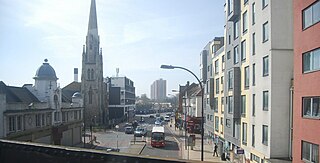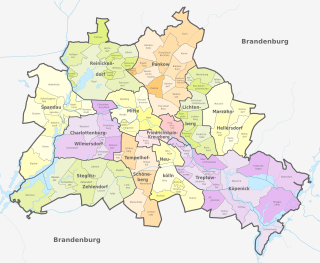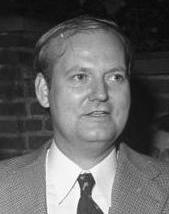
East Berlin was the partially recognised capital of East Germany (GDR) from 1949 to 1990. From 1945, it was the Soviet occupation sector of Berlin. The American, British, and French sectors were known as West Berlin. From 13 August 1961 until 9 November 1989, East Berlin was separated from West Berlin by the Berlin Wall. The Western Allied powers did not recognize East Berlin as the GDR's capital, nor the GDR's authority to govern East Berlin. For most of its administrative existence, East Berlin was officially known as Berlin, capital of the GDR by the GDR government. On 3 October 1990, the day Germany was officially reunified, East and West Berlin formally reunited as the city of Berlin.

Lewisham is a London borough in south-east London, England. It forms part of Inner London. The principal settlement of the borough is Lewisham. The local authority is Lewisham London Borough Council, based in Catford. The Prime Meridian passes through Lewisham. Blackheath, Goldsmiths, University of London and Millwall F.C. are located within the borough.

Spandau is the westernmost of the 12 boroughs of Berlin, situated at the confluence of the Havel and Spree rivers and extending along the western bank of the Havel. It is the smallest borough by population, but the fourth largest by land area.

Liverpool City Council is the local authority for the city of Liverpool in Merseyside, England. Liverpool has had a local authority since 1207, which has been reformed on numerous occasions. Since 1974 the council has been a metropolitan borough council. It provides the majority of local government services in the city. The council has been a member of the Liverpool City Region Combined Authority since 2014.

Mitte is the first and most central borough of Berlin. The borough consists of six sub-entities: Mitte proper, Gesundbrunnen, Hansaviertel, Moabit, Tiergarten and Wedding.

Charlottenburg-Wilmersdorf is the fourth borough of Berlin, formed in an administrative reform with effect from 1 January 2001, by merging the former boroughs of Charlottenburg and Wilmersdorf.

Neukölln is one of the twelve boroughs of Berlin, Germany. It is located south of Berlin's centre and stretches southeastwards to the city boundary, encompassing the localities of Neukölln, Britz, Buckow, Rudow and Gropiusstadt.

Lichtenberg is the eleventh borough of Berlin, Germany. In Berlin's 2001 administrative reform it absorbed the former borough of Hohenschönhausen.

Federal elections were held in West Germany on 14 August 1949 to elect the members of the first Bundestag, with a further eight seats elected in West Berlin between 1949 and January 1952 and another eleven between February 1952 and 1953. They were the first free federal elections in West Germany since 1933 and the first after the division of the country.

Eberhard Diepgen is a German lawyer and politician who served as Mayor of West Berlin from 1984 to 1989 and again as Mayor of (united) Berlin, from 1991 until 2001, as member of the Christian Democratic Union (CDU).

Berlin is divided into boroughs or administrative districts. In Berlin, the term is officially shortened to Bezirke (districts). The boroughs are further divided into quarters. These smaller localities are officially recognised, but have no administrative bodies of their own. Quarters and many of their subunits, the neighborhoods, typically have strong identities that sometimes predate their inclusion into the modern boundaries of Berlin. Both the boroughs and the quarters function differently to other subdivisions in Germany due to Berlin's dual status as an independent city as well as a federated state of Germany in its own right.

Walter Momper is a German politician of the SPD and former Governing Mayor of Berlin. Whilst Governing Mayor, he served as President of the Bundesrat in 1989/90. He was at the opening of the Brandenburg Gate on 22 December 1989 and, on 3 October 1990, became the first mayor of a reunited Berlin.

Louise Dorothea Schroeder was a German politician of the Social Democratic Party of Germany (SPD) party. She was among the 41 female members of the Weimar National Assembly, the Constituent Assembly of the Weimar Republic and subsequently remained a member of the Reichstag until 1933. An educator and activist central in the Arbeiterwohlfahrt movement, and she was under scrutiny of the Nazi Party during the 1930s and 1940s for her socialist positions. After the partition of Germany following World War II, she served as governing mayor of West Berlin in 1948. Until Franziska Giffey was sworn in in 2021, she was the only woman to have served as Mayor of Berlin.

Dietrich Stobbe was a German politician who served as the Mayor of West Berlin from 1977 to 1981, as a member of the Social Democratic Party (SPD). Stobbe also served as President of the Bundesrat from 1 November 1978 to 31 October 1979.

The governing mayor of Berlin is the head of government, presiding over the Berlin Senate. As Berlin is an independent city as well as one of the constituent states of Germany, the office is the equivalent of the ministers president of the other German states, except the states of Hamburg and Bremen, where the heads of government are called "First Mayor" and "President of the Senate and Mayor", respectively. The title Governing Mayor of Berlin is the equivalent of Lord Mayor in the meaning of an actual executive leader.

The Senate of Berlin is the executive body governing the city of Berlin, which at the same time is a state of Germany. According to the Constitution of Berlin the Senate consists of the Governing Mayor of Berlin and up to ten senators appointed by the governing mayor, two of whom are appointed (deputy) mayors. The Senate meets weekly at the Rotes Rathaus.

Berlin is a city-state and the capital of the Federal Republic of Germany.

The 1985 Los Angeles mayoral election took place on April 9, 1985. Incumbent Tom Bradley was re-elected over councilmember John Ferraro. Bradley's re-election would give him a fourth term, an unprecedented feat in the office as no mayor except for James R. Toberman had been re-elected to a fourth consecutive term.

Karl-Georg Wellmann is a German politician of the Christian Democratic Union (CDU). From 2001 to 2005, he was member of the Abgeordnetenhaus, the state parliament of Berlin. Between 2005 and 2017, he was an MP of the German Bundestag.

Helin Evrim Sommer is a German politician, a former member of the Berlin House of Representatives and of the German Bundestag for the state of Berlin. She was a member of The Left party until May 2022.






















